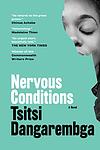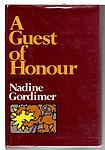The Greatest "Zimbabwe" Books of All Time
Click to learn how this list is calculated.
This list represents a comprehensive and trusted collection of the greatest books. Developed through a specialized algorithm, it brings together 284 'best of' book lists to form a definitive guide to the world's most acclaimed books. For those interested in how these books are chosen, additional details can be found on the rankings page.
Genres
Countries
Date Range
Reading Statistics
Click the button below to see how many of these books you've read!
Download
If you're interested in downloading this list as a CSV file for use in a spreadsheet application, you can easily do so by clicking the button below. Please note that to ensure a manageable file size and faster download, the CSV will include details for only the first 500 books.
Download-
1. Nervous Conditions by Tsitsi Dangarembga
"Nervous Conditions" is a semi-autobiographical novel set in colonial Rhodesia in the 1960s. The story follows a young girl from a poor family who gets the opportunity to receive an education after her brother's death. Despite the struggles she faces - including culture shock, racism, and the inherent sexism in both her native and adopted cultures - she perseveres and manages to succeed. The novel explores themes of race, colonialism, and gender through the lens of a young African woman's coming-of-age story.
-
2. The Grass Is Singing by Doris Lessing
Set in 1940s Southern Rhodesia (now Zimbabwe), this novel explores the life of a white woman, Mary, who marries a poor farmer, Dick Turner, and moves to the African veld. The story delves into their failing farm, their troubled marriage, and the racial tension surrounding their life. The isolation and harsh African environment take a toll on Mary's sanity, leading to a complex and ultimately fatal relationship with her black houseboy, Moses. The book provides a stark examination of the inherent racism of colonialism and the tragic consequences it can have on both the oppressors and the oppressed.
-
3. House Of Hunger by Dambudzo Marechera
"House of Hunger" is a powerful collection of stories and poems that vividly depict the struggles and despair experienced by the marginalized individuals living in post-colonial Zimbabwe. Through a raw and fragmented narrative style, the author explores themes of poverty, violence, and the loss of cultural identity, providing a haunting portrayal of a society grappling with the aftermath of colonialism. Marechera's poignant and thought-provoking work serves as a powerful critique of social and political injustices, leaving readers both disturbed and enlightened.
-
4. Bones by Chenjerai Hove
"Bones" is a poignant and powerful novel set in a post-colonial African village, exploring the devastating impact of war and oppression on its inhabitants. Through the eyes of an unnamed narrator, the story delves into the personal and collective struggles of a community haunted by the atrocities of the past, as they grapple with themes of memory, trauma, and the search for identity and justice. Hove's lyrical prose and evocative imagery create a vivid portrayal of a society torn apart by violence, while also offering glimpses of hope and resilience amidst the ruins.
-
5. Stories From A Shona Childhood by Charles Mungoshi
"Stories From A Shona Childhood" is a captivating memoir that delves into the author's experiences growing up in a rural village in Zimbabwe. Through a collection of poignant and vividly recounted anecdotes, the book offers a glimpse into the customs, traditions, and challenges faced by the Shona people. With a blend of humor, nostalgia, and cultural insights, the author paints a rich and heartfelt portrait of his childhood, highlighting the importance of community, family, and storytelling in shaping his identity.
-
6. Butterfly Burning by Yvonne Vera
"Butterfly Burning" is a powerful and evocative novel set in Zimbabwe during the 1940s. The story follows the life of Phephelaphi, a young woman who dreams of escaping her small village and the confines of societal expectations. As she navigates the complexities of love, loss, and her own desires, Phephelaphi's journey becomes a poignant exploration of the human spirit and the quest for freedom in a deeply oppressive world.
-
7. A Guest Of Honour by Nadine Gordimer
"A Guest Of Honour" is a thought-provoking novel that delves into the complexities of political power and personal morality. Set in an unnamed African country, the story follows a British colonial administrator who is appointed as a temporary president after the country gains independence. As he navigates the murky waters of post-colonial politics, he is forced to confront his own beliefs and confront the consequences of his actions. The novel explores themes of identity, loyalty, and the clash between personal and political ideals.
Reading Statistics
Click the button below to see how many of these books you've read!
Download
If you're interested in downloading this list as a CSV file for use in a spreadsheet application, you can easily do so by clicking the button below. Please note that to ensure a manageable file size and faster download, the CSV will include details for only the first 500 books.
Download





